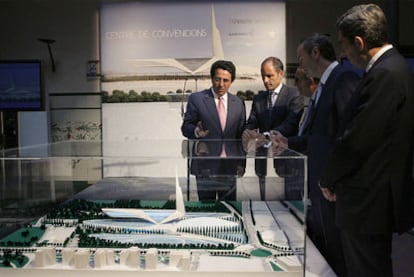Renowned architect gets bloated fees
Allegations made against Santiago Calatrava after questionable contract leaked
In 2006, the then-Balearic regional premier, Jaume Matas, of the Popular Party, decided to pay 1.2 million euros to internationally renowned architect Santiago Calatrava to help him draft new building regulations, and come up with an architectural model and videos taken of the local opera house.
The payment with public money led to the opening of a corruption investigation codenamed Operation Palma Arena, in which both Matas and Calatrava are named as principal targets of the criminal inquiry.
That same year, Valencia regional government officials signed a 2.7-million-eurocontract for the design and construction of a convention center in Castellón. The contract was awarded without going to tender.
Calatrava collected the amount in 2009 as payment for his fees to come up with the master plan, the drafting of the regulations, and a basic design for the center, which has since been put on hold.
The details of the contract, signed by the Valencia government's public company Sociedad Proyectos Temáticos, were released by the region's United Left (Esquerra Unida) lawmaker Marina Albiol, who photographed the clauses using her cellphone.
It is the first time that a contract signed by the regional government with the controversial architect has come to light.
Albiol said that she was able to photograph the contract when she was allowed to read it.
In many cases, the regional government, headed by Francisco Camps, of the PP, has argued that public contracts have confidentiality clauses and as such cannot be released to the public.
"Public money cannot be used to fill the pockets of celebrity architects or to pay Camps' whims," Albiol said on Tuesday.
The United Left is expected to file a complaint with prosecutors next week along with those against two other projects — two towers near the entrance of the Valencia Arts Center and a dock at the Torrevieja port — both given to Calatrava. Both of them remain unfinished.
In a statement released on Wednesday, Sociedad Proyectos Temáticos categorically denied that "any improper payments have been made to architect Santiago Calatrava" and also rejected allegations made by Albiol that Calatrava had not delivered the masterplan, the preliminary draft and final design.
In all, Calatrava has made some 5.8 million euros from Camps' government with these three "ghost projects" as Albiol described them.
According to the Castellón contract, Calatrava earned a 12.5-percent commission on the total cost of the project, which is above normal for such major public construction work.
A clause states that his "commission would be adjusted according to the final costs" of the center, without any ceiling.
The EU party said that Calatrava was paid even though the project wasn't finished and he did not abide by the terms of contract.
Among the documents photographed by Albiol is an internal letter by the director of Sociedad Proyectos Temáticos, Javier de Diego, from November 2008.
"We do not understand the criteria used that now makes one of the three buildings cost 50 percent more than the original estimate," De Diego says. "We don't recall asking for another budget estimate to reflect this cost hike."
On May 12, 2008, Calatrava held a meeting with De Diego, where he presented his plans for the Castellón project. De Diego later complained to Eusebio Monzó, the director of public companies at the Valencia regional government, that "two weeks later, Santiago Calatrava publicly presented a grandiose model in Castellón that exceeded all the figures listed in any previous letters of intent or budgets."
Valencia's deputy premier Vicente Rambla on Wednesday also denied any improper payments were made to Calatrava, and said that adjustments were being made to the original contract.
"We are now adjusting and redesigning the project so that the costs will be rolled back to the original budget and so that we can also complete the construction of it," Rambla said.

Tu suscripción se está usando en otro dispositivo
¿Quieres añadir otro usuario a tu suscripción?
Si continúas leyendo en este dispositivo, no se podrá leer en el otro.
FlechaTu suscripción se está usando en otro dispositivo y solo puedes acceder a EL PAÍS desde un dispositivo a la vez.
Si quieres compartir tu cuenta, cambia tu suscripción a la modalidad Premium, así podrás añadir otro usuario. Cada uno accederá con su propia cuenta de email, lo que os permitirá personalizar vuestra experiencia en EL PAÍS.
¿Tienes una suscripción de empresa? Accede aquí para contratar más cuentas.
En el caso de no saber quién está usando tu cuenta, te recomendamos cambiar tu contraseña aquí.
Si decides continuar compartiendo tu cuenta, este mensaje se mostrará en tu dispositivo y en el de la otra persona que está usando tu cuenta de forma indefinida, afectando a tu experiencia de lectura. Puedes consultar aquí los términos y condiciones de la suscripción digital.
Últimas noticias
Most viewed
- Why we lost the habit of sleeping in two segments and how that changed our sense of time
- Trump’s obsession with putting his name on everything is unprecedented in the United States
- Pablo Escobar’s hippos: A serious environmental problem, 40 years on
- The Florida Keys tourist paradise is besieged by immigration agents: ‘We’ve never seen anything like this’
- Charles Dubouloz, mountaineering star, retires at 36 with a farewell tour inspired by Walter Bonatti








































